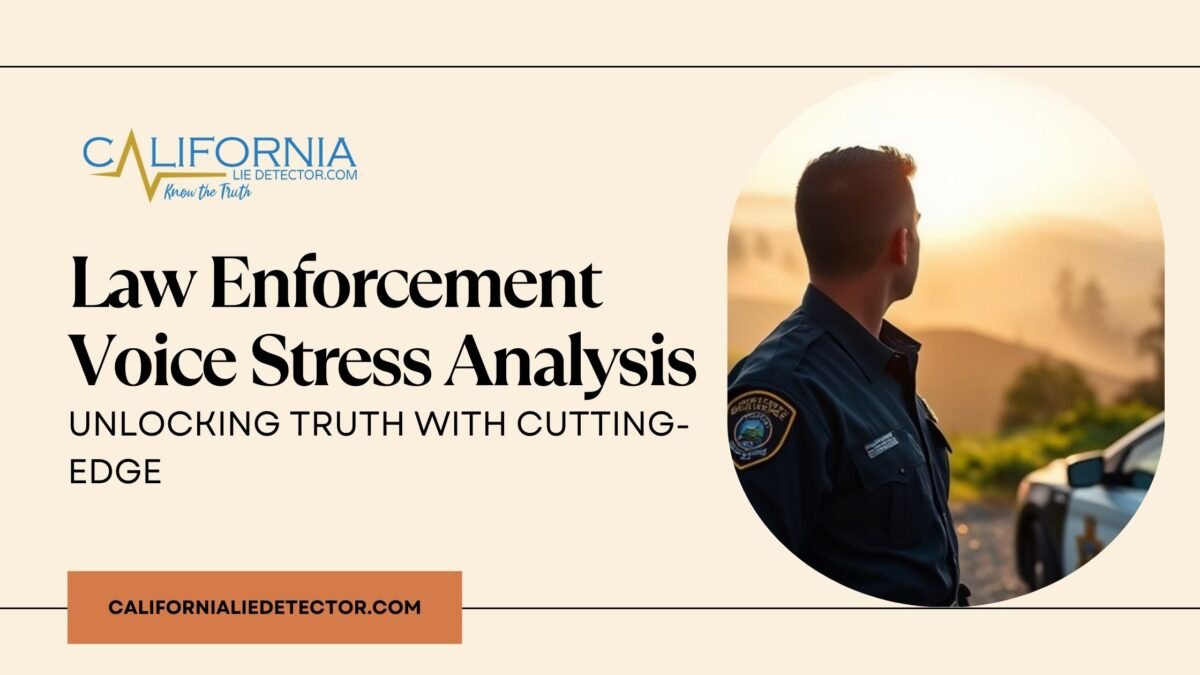Voice Stress Analysis (VSA) has rapidly become one of the most talked-about technologies in modern investigations. For law enforcement agencies, accuracy, efficiency, and credibility are non-negotiable. Traditional methods like polygraph tests, while still widely used, are increasingly being complemented—or sometimes replaced—by more advanced systems like Voice Stress Analysis. This innovative approach uses subtle changes in the human voice to detect stress patterns that may reveal deception.
This article explores how law enforcement voice stress analysis is transforming criminal investigations, its benefits, limitations, and why it is gaining recognition as a trusted tool for truth verification.
What Is Voice Stress Analysis?
Voice Stress Analysis is a non-invasive lie detection technique that analyzes vocal patterns to identify stress indicators. The human voice changes slightly under stress, even if the change is imperceptible to the human ear. Advanced VSA software captures these micro-tremors and measures them against baseline responses, helping investigators determine whether someone is speaking truthfully.
Unlike polygraph testing, which requires physical attachments like sensors and cuffs, VSA only needs a microphone and recording device. This makes it simpler, faster, and less intimidating for subjects undergoing testing.
Why Law Enforcement Relies on VSA
Law enforcement voice stress analysis is gaining traction for several compelling reasons:
1. Speed and Efficiency
Investigators can quickly assess suspects, witnesses, and victims without extensive preparation or setup. This allows officers to screen more individuals in less time, streamlining investigations.
2. Non-Invasive Technology
Because VSA requires no wires, cuffs, or sensors, it is less stressful for subjects. This non-invasive nature often leads to more cooperative participation and reliable results.
3. Adaptability in the Field
VSA can be used almost anywhere—during interrogations, on phone calls, or even in the field. Its portability makes it a valuable tool for real-time investigations.
4. Early Detection of Deception
By identifying vocal stress patterns early in an investigation, law enforcement can prioritize leads, verify statements, and rule out suspects more efficiently.
The Science Behind Voice Stress Analysis
At the heart of VSA is the detection of “microtremors.” These are tiny, involuntary vibrations in the vocal cords that occur under psychological stress. When a person lies, the brain experiences cognitive dissonance and anxiety, which manifest as vocal tremors.
Specialized software analyzes the pitch, frequency, and amplitude of the voice to detect these patterns. While not foolproof, the results can provide strong indicators of truthfulness when combined with other investigative evidence.
Benefits Over Traditional Polygraph Tests
While polygraphs remain a staple in investigative work, VSA offers unique advantages:
- No Physical Restraints: Subjects often feel more at ease without wires or sensors attached.
- Remote Testing: Interviews conducted over phone or video calls can still be analyzed.
- Faster Results: Immediate feedback enables quicker decision-making.
- Lower Costs: Less equipment and setup make it more affordable for agencies.
These benefits make law enforcement voice stress analysis particularly appealing for agencies with limited budgets or high caseloads.
Applications in Law Enforcement
The uses of VSA in law enforcement are wide-ranging:
- Criminal Investigations: Detecting deception during interrogations.
- Background Checks: Screening potential hires in sensitive positions.
- Internal Affairs: Ensuring accountability and integrity within departments.
- Counterterrorism: Analyzing communications to detect potential threats.
- Victim and Witness Interviews: Validating testimonies in sensitive cases.
Limitations and Criticisms
While powerful, VSA is not without its challenges:
- Accuracy Concerns: Critics argue that stress doesn’t always equal deception. Nervous or traumatized individuals may show stress even when telling the truth.
- Legal Admissibility: Courts in many jurisdictions still debate the admissibility of VSA results as evidence.
- Dependence on Skilled Operators: The effectiveness of VSA relies heavily on trained professionals who know how to interpret results accurately.
These limitations highlight the importance of using VSA as a complementary tool rather than a standalone solution.
The Future of Voice Stress Analysis in Law Enforcement
Advancements in artificial intelligence (AI) and machine learning are expected to enhance the accuracy and reliability of VSA. By combining vocal analysis with biometric data and behavioral cues, future systems could create a more comprehensive lie detection framework.
As technology evolves, the integration of VSA with digital forensics, surveillance, and investigative databases could revolutionize how agencies detect deception and solve crimes.
Building Public Trust with VSA
One of the critical challenges law enforcement faces is maintaining public trust. Tools like VSA can strengthen transparency and accountability when applied ethically. For example, confirming alibis quickly or validating witness statements can ensure justice is served more effectively.
However, agencies must also establish clear policies to prevent misuse and ensure the rights of individuals are respected during investigations.
Conclusion
Law enforcement voice stress analysis represents a significant leap forward in truth verification technology. With its non-invasive approach, rapid results, and adaptability, VSA offers law enforcement agencies a powerful tool to support investigations. While it is not perfect and must be applied responsibly, its potential is undeniable.
As more agencies embrace this cutting-edge solution, it may soon become as common as traditional polygraph tests—if not more so. For individuals, businesses, and law enforcement professionals seeking reliable truth verification, California Lie Detector provides trusted expertise in both polygraph and voice stress analysis testing.

